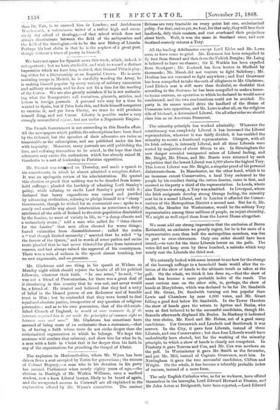We naturally looked with some interest to see how far
the change of the borough suffrage to a household basis would alter the re- lation of the show of hands to the ultimate result as taken at the poll. On the whole, we think it has done so,—that the show of hands has become a more probable index of the result. The most curious case ou the other side, is, perhaps, the show of hands at Marylebone, which was declared to be for Dr. Sandwith and Mr. Grant, Dr. Sandwith turning out less popular than Lewis and Chambers by near 4,000 votes, and Mr. Grant falling a good deal below Dr. Sandwith. In the Tower Hamlets the show of hands gave the return to Ayrton and Beales, who were at first believed to be the successful candidates, though Mr. Samuda afterwards displaced Mr. Beales. In Hackney it indicated the true choice, Mr. Reed and Mr. Holms, out of a good many candidates. For Greenwich and Lambeth and Southwark it was correct. In the City, it gave four Liberals, instead of three Liberals, and one Conservative ; but then four Liberals would have undoubtedly been elected, but for the working of the minority principle, to which a show of hands is clearly not competent. In Finsbury it gave Torrens and Cox, and Mr. Cox was nowhere on the poll. In Westminster it gave Mr. Smith as the favourite, and put Mr. Mill, instead of Captain Grosvenor, next him. In Nottingham it -gave the two successful candidates, Clifton and Wright. On the whole, it has become a tolerably probable index of success, instead of a mere form.






































 Previous page
Previous page